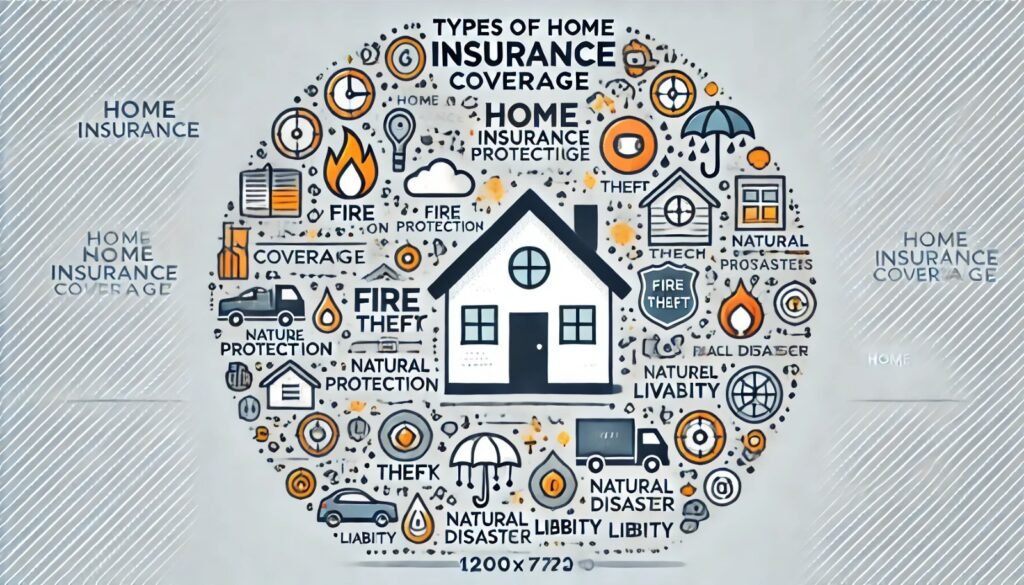When it comes to safeguarding your most significant investment, home insurance plays a crucial role. Owning a home is not just about having a place to live; it’s about securing a valuable asset that can appreciate over time. This is where homeowners insurance comes into play, offering a safety net against unforeseen events that could lead to financial loss.
Home insurance provides comprehensive coverage for various risks, including natural disasters, theft, and accidents. It ensures that you are not left financially vulnerable in the face of unexpected damages or losses. By investing in a robust property insurance policy, you can protect your home, its contents, and even your personal liability.
Understanding Home Insurance
What is Home Insurance?
Home insurance, also known as homeowners insurance or house insurance, is a type of property insurance that provides financial protection against various risks to your home. It is designed to cover losses and damages to an individual’s house and assets in the home. Home insurance typically includes interior damage, exterior damage, loss or damage of personal assets, and injury that arises while on the property.
Types of Home Insurance Coverage
Home insurance policies come with various types of coverage to address different needs and risks. Understanding these coverages can help homeowners choose the right policy for their specific situation. Here are the main types of coverage typically included in a home insurance policy:

Dwelling Coverage:
This covers the physical structure of your home, including the walls, roof, and any attached structures like a garage. It helps pay for repairs or rebuilding if your home is damaged by covered perils such as fire, wind, or hail.
Liability Insurance:
This provides protection against legal and medical expenses if someone is injured on your property or if you accidentally cause damage to someone else’s property. It can cover costs related to lawsuits, medical bills, and even lost wages.
Personal Property Coverage:
This covers the belongings inside your home, such as furniture, electronics, and clothing. If your personal property is stolen or damaged by a covered event, this coverage helps pay for repair or replacement.
Each type of coverage plays a vital role in providing comprehensive protection for homeowners. By understanding the different coverages available, you can make informed decisions about the level of protection you need for your home and personal belongings.
Financial Aspects of Home Insurance
Insurance Premiums and Policies
An insurance premium is the amount of money that a homeowner pays to an insurance company in exchange for coverage. This payment can be made on a monthly, quarterly, or annual basis, depending on the terms of the insurance policy. The premium is determined by various factors, including the value of the home, the location, the type of coverage selected, and the homeowner’s claim history.
There are several types of insurance policies available to homeowners. The most common types include:
HO-1 Basic Form:
This is the most basic form of home insurance, covering only specific perils such as fire, theft, and vandalism.
HO-2 Broad Form:
This policy covers all the perils included in HO-1, plus additional perils such as falling objects and water damage from plumbing issues.
HO-3 Special Form:
The most popular type of home insurance policy, HO-3 covers all perils except those specifically excluded in the policy.
HO-4 Tenant’s Form:
Also known as renter’s insurance, this policy covers personal property and liability for tenants.
HO-5 Comprehensive Form:
This policy offers the broadest coverage, including all perils except those explicitly excluded.
HO-6 Condo Form:
Designed for condominium owners, this policy covers personal property and the interior structure of the unit.
HO-7 Mobile Home Form:
This policy is specifically for mobile or manufactured homes.
HO-8 Older Home Form:
This policy is tailored for older homes where the replacement cost may exceed the market value.
Home Insurance Quotes and Rates
Obtaining home insurance quotes is an essential step in finding the right coverage for your home. A quote is an estimate of the premium you will pay for a specific policy. To get accurate home insurance quotes, you will need to provide detailed information about your home, including its size, age, location, and the type of coverage you are seeking.
Several factors can affect home insurance rates. These include:
Location: Homes in areas prone to natural disasters or high crime rates typically have higher insurance rates.
Home Value: The higher the value of your home, the higher the insurance premium.
Deductible Amount: Choosing a higher deductible can lower your premium, but it means you will pay more out-of-pocket in the event of a claim.
Coverage Amount: The more coverage you purchase, the higher your premium will be.
Home Condition: Older homes or homes in poor condition may have higher rates due to the increased risk of damage.
Claims History: If you have a history of filing claims, you may face higher premiums.
Credit Score: Some insurance companies use credit scores to determine rates, with higher scores often resulting in lower premiums.
To learn more about how to get the best home insurance rates, you can visit this guide on homeowners insurance.
Choosing the Right Home Insurance
Home Insurance Companies and Providers
Choosing the right home insurance company is crucial for ensuring that your home and belongings are adequately protected. Here are some steps to help you make an informed decision:
Research and Reviews: Start by researching various home insurance companies. Look for customer reviews and ratings to gauge their reputation and reliability.
Financial Stability: Check the financial stability of the home insurance providers. Companies with strong financial health are more likely to pay out claims promptly.
Coverage Options: Evaluate the coverage options offered by different home insurance companies. Ensure that they provide comprehensive coverage that meets your needs.
Customer Service: Good customer service is essential. Choose a provider known for excellent customer support and ease of communication.
Discounts and Benefits: Look for any discounts or additional benefits that the home insurance providers may offer. This can help you save money on premiums.
Here are some reputable home insurance providers to consider:
State Farm
Allstate
Liberty Mutual
USAA (for military members and their families)
Nationwide
Cost and Benefits of Home Insurance
Understanding Home Insurance Costs
When considering home insurance cost, it’s important to understand the various factors that contribute to the overall expense. The cost of home insurance can vary significantly based on several key elements:
Location: The geographical location of your home plays a crucial role in determining the home insurance cost. Areas prone to natural disasters or high crime rates typically have higher premiums.
Home Value: The replacement cost of your home, which is the amount it would take to rebuild it from scratch, directly impacts the home insurance cost.
Coverage Amount: The extent of home insurance coverage you choose, including dwelling, personal property, and liability coverage, will affect the premium.
Deductible: The deductible is the amount you pay out of pocket before the insurance kicks in. A higher deductible usually means a lower premium, but it also means more out-of-pocket expenses in the event of a claim.
Claims History: Your past claims history can influence your home insurance cost. Frequent claims may result in higher premiums.
Home Features: Features such as the age of the home, type of construction, and security systems can also impact the cost.
Understanding these factors can help you make informed decisions when selecting a policy that fits your budget and needs.
Benefits of Home Insurance
Having home insurance provides numerous benefits that can offer peace of mind and financial protection. Here are some key home insurance benefits:
Financial Protection: One of the primary home insurance benefits is financial protection against unexpected events such as fire, theft, or natural disasters. It helps cover the cost of repairs or rebuilding your home.
Liability Coverage: Home insurance typically includes liability coverage, which protects you if someone is injured on your property and decides to sue. This can cover legal fees and medical expenses.
Personal Property Coverage: In addition to covering the structure of your home, home insurance also protects your personal belongings, such as furniture, electronics, and clothing, against damage or theft.
Temporary Living Expenses: If your home becomes uninhabitable due to a covered event, home insurance can help pay for temporary living expenses, such as hotel stays and meals, while your home is being repaired.
Peace of Mind: Knowing that you have home insurance coverage provides peace of mind, allowing you to focus on other aspects of your life without worrying about potential financial losses.
Compliance with Mortgage Requirements: Most mortgage lenders require homeowners to have insurance as a condition of the loan. Having home insurance ensures you meet these home insurance requirements.

